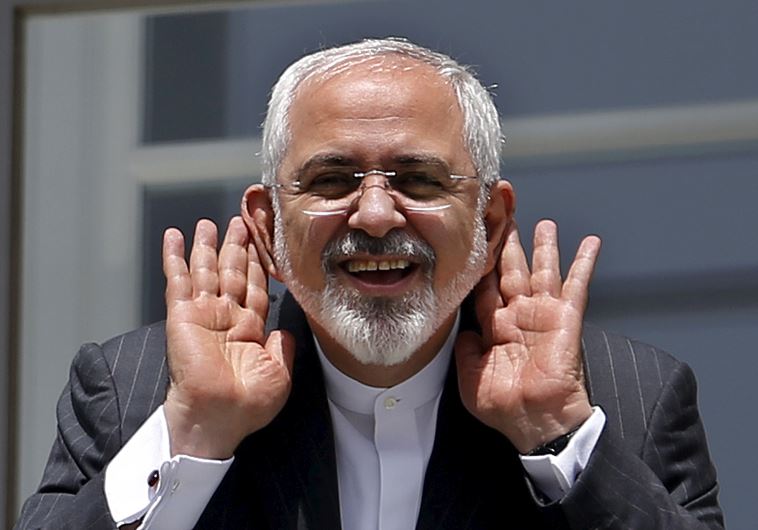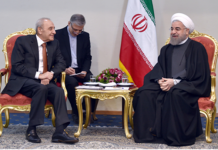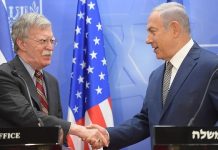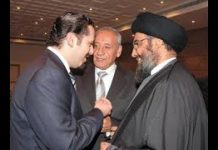ظريف: تعاونا مع السعودية في لبنان
عبد الرحمن الراشد/الشرق الأوسط/20 كانون الثاني/17
«تمكنت إيران والسعودية من وقف عرقلة عملية الانتخابات الرئاسية في لبنان. وقد حققنا نجاحًا». هذا ما تحدث به وزير الخارجية الإيراني، جواد ظريف، في منتدى دافوس الاقتصادي. وعرض أمام الحضور رغبة بلاده في التعاون مع السعودية لحل قضايا «سوريا واليمن والبحرين وغيرها».
ما عرضه الوزير الإيراني على السعودية، من على مسرح مفتوح، مقترحًا العمل المشترك لإنهاء الصراعات في المنطقة، هو دعوة جديدة تكررت حديثًا على لسان مسؤولين إيرانيين. لماذا؟ هل نحن نشهد تبدلاً في السياسة الإيرانية العدوانية، التي كانت تعتبر مشروعها هو محاصرة السعودية وحلفائها؟ أم إنه استباق إيراني للتطورات على الساحة الدولية، مع ما نراه من ملامح تغيير في السياسة الأميركية، بخروج صديقهم باراك أوباما المنتهية رئاسته، وقدوم إدارة أميركية جديدة عبرت صراحة عن عزمها على مواجهة إيران، وكذلك الإشارات التي تبعث بها روسيا بأنها لا تريد أن تبقى حليفة وشريكة في الحرب مع إيران وسوريا؟ والاحتمال الثالث أن تعبير الوزير ظريف عن رغبة بلاده في التعاون مع السعودية، هو فقط مجرد كلام في برنامج علاقات عامة لتحسين صورة الجمهورية الإيرانية في منتدى دافوس.
ما طرحه الوزير ظريف عن آفاق التعاون بين إيران والمملكة العربية السعودية، وتحديدًا التعاون معًا من أجل إنهاء الصراعات في المنطقة، ليس محل الاستنكار، بل الغريب أن يصدر عن إيران. وهو تطور إيجابي لولا أن تفسير نظام طهران لمصطلح «التعاون» هنا هو أن نقبل سياسيًا بما تفرضه إيران بالإثم والعدوان، في سوريا واليمن مثلاً. وهي تسعى الآن لفرض مفهومها لـ«التعاون» في سوريا، في مؤتمر آستانة، وسبق أن حاولته في البحرين وأفشلته الدول الخليجية.
هل، فعلاً، جرى تعاون بين البلدين في لبنان ويصلح نموذجًا قابلاً للاستنساخ؟ الوصول إلى القبول برئاسة ميشال عون في لبنان مر بمراحل شد وجذب بين القوى اللبنانية نفسها، وبعد مرور فراغ طويل عطّل العمل الحكومي ومؤسسات الدولة، لم يبقَ أمام وكلاء إيران ما يمكنهم تحقيقه، بخاصة بعد أن أعلنت السعودية امتناعها عن التعاطي مع الشأن اللبناني، حتى في إزالة القمامة من الشوارع، لم يفلحوا! وطالما أن الرئاسة الجديدة لا تتبنى مواقف عدائية ضد السعودية، ولا تسمح لأحد بممارستها على الأراضي اللبنانية، وطالما أن الفرقاء اللبنانيين راضون، فإن تحفظات الرياض تزول، وهذا ما حدث.
أما التعاون النفطي الذي أشار إليه ظريف، فالحقيقة أن التعاون تم بين السعودية وروسيا، ولم تكن إيران طرفًا مباشرًا فيه، وتولت الحكومة الروسية إلزام الإيرانيين باحترام حصتهم من الإنتاج المتفق عليها سابقًا.
وهذا لا يعني أن ما قاله ظريف من حيث المبدأ خاطئ، «لا أرى سببًا في أن تكون هناك سياسات عدائية بين إيران والسعودية. حقيقة يمكننا العمل معًا لإنهاء الأوضاع المأساوية لشعوب سوريا واليمن والبحرين وغيرها من دول المنطقة».
في المنطقة توجد دولة واحدة لها سياسة عدوانية هي إيران. أما الدول الخليجية، وغيرها من دول المنطقة، فهي تلجأ إلى السياسة الدفاعية ضد إيران. ولا يحتاج ظريف إلى أن تشن دولته حروبًا يقتل فيها مئات الآلاف، ويشرد ملايين الناس، حتى يكتشف أنه لا يوجد هناك سبب معقول للعداء مع جيرانها!
نجحت سلطات طهران في خلْق ميليشيات، قامت بتجميعها من أنحاء دول المنطقة، لشن حروب وعمليات إرهابية، لكن هذه السياسة تنقلب الآن على إيران، لأنها فتحت صراعات مذهبية وعرقية مضادة، وأجبرت دول المنطقة على التحول إلى الانخراط في الحروب دفاعًا عن نفسها. هذا كله من سببه إيران التي انخرطت في القتال مباشرة في العراق وسوريا، وتمول عسكريًا المتمردين في اليمن.
هل يناسب دول المنطقة، وتحديدًا الخليجية، التعاون مع إيران؟ أتصور أنه أمر مستبعد في ظل الهجمة الإيرانية العسكرية. كل ما نلمسه الآن، أنها تقوم بتخريب كل مساعي التصالح. فالقوى الإيرانية على الأرض حاولت تخريب اتفاق حلب، بين روسيا وتركيا، وتضغط على الحوثيين المتمردين في اليمن لرفض الحل السياسي، بعد أن كانوا قد قبلوا به.
Zarif: We cooperated with Saudi Arabia in Lebanon
Abdulrahman al-Rashed/Al Arabiya/January 20/17
“Iran and Saudi Arabia managed to end the obstruction of the presidential election process in Lebanon, and we succeeded.” This is what Iranian Foreign Minister Mohammad Javad Zarif said at the World Economic Forum at Davos. He also told the participants that his country desires to cooperate with Saudi Arabia to resolve issues in Syria, Yemen, Bahrain and other countries. The Iranian minister made his proposal to Saudi Arabia from an open forum. His proposal to work together to end conflicts in the region is a new call made by Iranian officials recently. Why so? Are we witnessing a change in Iran’s hostile policy designed to besiege Saudi Arabia and its allies? Or is Iran making preemptive moves to address developments at the global stage, especially considering change expected in American policy?
Their friend Barack Obama is set to exit power and there will be a new administration that has frankly expressed its intention to confront Iran. This is in addition to Russian signs that it does not want to remain an ally and partner in the war with Iran and Syria. The other possibility is that Zarif’s statements about his country’s desire to work with Saudi Arabia may just aim to serve public relations purposes to improve the image of Iran at the Davos meeting.
Zarif’s proposal about cooperation between Iran and Saudi Arabia, and particularly cooperation to end conflicts in the region, is not condemned. However, it is strange that Iran makes such a proposal. It’s a positive development but the Iranian regime’s interpretation of the term “cooperation” here is to politically accept what Iran imposes through wrongdoing and aggression, such as the case is in Syria and Yemen. Tehran is now seeking to impose its concept of “cooperation” in Syria at the Astana conference and it has previously tried to do so in Bahrain before Gulf countries thwarted its attempts. Has there really been cooperation between the two countries in Lebanon and is this cooperation a model that can be followed?
Their friend Barack Obama is set to exit power and there will be a new administration that has frankly expressed its intention to confront Iran
Election of Michel Aoun
The process of agreeing to elect Michel Aoun as president in Lebanon went through several phases among Lebanese parties themselves. After years of presidential vacuum that obstructed the functioning of the government and state institutions, Iran’s agents had nothing to achieve especially after Saudi Arabia announced it will not deal with Lebanese affairs.
The Lebanese could not even remove trash from their streets. As long as the new president does not adopt hostile stances against Saudi Arabia and does not allow anyone to have such stances in the country and as long as the Lebanese parties are satisfied, Riyadh’s reservations will end and this is what happened. As for Zarif’s statements about cooperation regarding oil matters, this cooperation actually happened between Saudi Arabia and Russia and Iran was not a direct party in it. The Russian government obligated the Iranians to respect production of their share of oil as previously agreed on. This does not mean that what Zarif said in principle is wrong. He said: “I don’t see a reason for hostile policies between Iran and Saudi Arabia. Truth be told, we can work together to end the tragic situations of people in Syria, Yemen, Bahrain and other countries in the region.”There is one country in the region that has hostile policies and that would be Iran. Gulf countries, and other countries in the region, resort to a defensive policy against Iran. Zarif does not need to have his country launch wars that kill thousands of people and displace millions to realize there is no reasonable reason for hostility with Iran’s neighbors. Tehran has succeeded at creating militias gathered from across the region to launch wars and carry out terrorist operations. But this policy has now backfired on Iran because it has led to the creation of opposing sectarian and ethnic conflicts and forced the region’s countries to go ahead and participate in wars to defend themselves. All this was caused by Iran which is directly engaged in the fighting in Iraq and Syria and which militarily funds rebels in Yemen.
Does it suit countries in the region, particularly Gulf countries, to cooperate with Iran? I think it is unlikely amid this Iranian military attack. All we have seen so far is that Iran is sabotaging all reconciliation attempts. Iranian powers on the ground tried to sabotage the Aleppo agreement between Russia and Turkey and they are pressurizing the Houthi rebels in Yemen to reject the political solution after they had accepted it.
**This article was first published in Asharq Al-Awsat on January 19, 2017.























